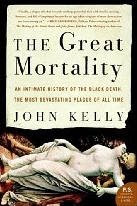A Bone of Contention by Susanna Gregory
 The King’s Ditch is finally being dredged, and a number of bones are among the items unearthed. Cambridge in general, and the Master of Valence Marie in particular, wants them to belong to martyr Simon D’Ambrey. The university chancellor doesn’t; a college’s possession of a piece of the local hero would be sure to spark yet more town-and-gown riots. Enter physician and Michaelhouse College fellow Matthew Bartholomew; but despite his best efforts Valence Marie insists on claiming the discovery of a relic. Bartholomew also has to deal with a hypochondriacal Junior Proctor, a missing woman, a stolen ring, burglaries, mob violence, attempted murder, and Brother Michael’s agonisingly bad choir ... and the King’s Ditch contains a much fresher corpse than D’Ambrey’s.
The King’s Ditch is finally being dredged, and a number of bones are among the items unearthed. Cambridge in general, and the Master of Valence Marie in particular, wants them to belong to martyr Simon D’Ambrey. The university chancellor doesn’t; a college’s possession of a piece of the local hero would be sure to spark yet more town-and-gown riots. Enter physician and Michaelhouse College fellow Matthew Bartholomew; but despite his best efforts Valence Marie insists on claiming the discovery of a relic. Bartholomew also has to deal with a hypochondriacal Junior Proctor, a missing woman, a stolen ring, burglaries, mob violence, attempted murder, and Brother Michael’s agonisingly bad choir ... and the King’s Ditch contains a much fresher corpse than D’Ambrey’s.
It’s a sure sign that a book is good when it cheers you up even though you’re recovering from a bout of illness and slipping steadily behind target in NaNoWriMo. And when it makes you find the energy to laugh even though you feel like you’ve been run over by the Gold Coast express. From Bartholomew’s blissful obliviousness of Eleanor Tyler’s efforts to snare him, to a Founder’s Day feast to remember, there was plenty to keep me amused - and a good thing, too, with a body count that high. It’s a good thing Bartholomew doesn’t get into predicaments like this too often, or Cambridge would be swiftly depopulated.
I’ve learnt by now - the third in the series - not to assume that anything is irrelevant, so I Unfortunately it was let down by a woefully anti-climatic ending. One of the main threads of the plot wrapped up in a way that left me thinking, What? That's it? Where's the drama?. And there was no lack of opportunity to have it end with the proper bang.
Rating: B
The Great Mortality by John Kelly
 In 1346, a terrible and virulent new disease appeared in the Crimea. From the trading port of Caffa it spread across Europe, leaving millions dead in its wake and not a corner of the continent unaffected. Medicine and prayer were alike powerless; the best that anyone could do was bury the dead as quickly as possible. This biography of a disease follows the Black Death from its probable origins in central Asia to its last, sporadic outbreaks. Along the way it blends science, history, and personal stories to create an overall picture of life in the midst of death.
In 1346, a terrible and virulent new disease appeared in the Crimea. From the trading port of Caffa it spread across Europe, leaving millions dead in its wake and not a corner of the continent unaffected. Medicine and prayer were alike powerless; the best that anyone could do was bury the dead as quickly as possible. This biography of a disease follows the Black Death from its probable origins in central Asia to its last, sporadic outbreaks. Along the way it blends science, history, and personal stories to create an overall picture of life in the midst of death.
I felt a teeny bit morbid, getting enthusiastic at the sight of a book about the worst epidemic in history. And enjoying it so much. But it was good - a balance of the educational and the entertaining, the continental and the local. The plague is as much a character as any of the people who feature, given the personification of a traveller with a love of dealing death. At times it was a bit like reading a biography.
The historical figures who appear cover everything from the well-known to the long-forgotten, the tragic to the comic, the heroic to the ... less than scrupulous. (Some people just can’t resist an opportunity to make a quick profit, even when their fellow citizens are dropping like flies.) After the plague’s first few destinations the details of its spread became repetitive, but the individual stories kept it interesting.
Rating: A-











3 comments:
Interesting reviews - thanks for sharing. I am sure that I have read something else by Susanna Gregory but right now I just can't remember what.... how frustrating. Enjoy your reading! Hannah
I tend to enjoy well-written plague fiction and non-fiction. I have The Great Mortality sitting on my bookshelves. I just finished reading Company of Liars by Karen Maitland which is a story of a group of English people fleeing the plague in 1348. I thought it was very good.
I can't figure out why, but books about plague always fascinate me. Morbid curiosity, perhaps? Anywho...just added Great Mortality to my wishlist.
Post a Comment